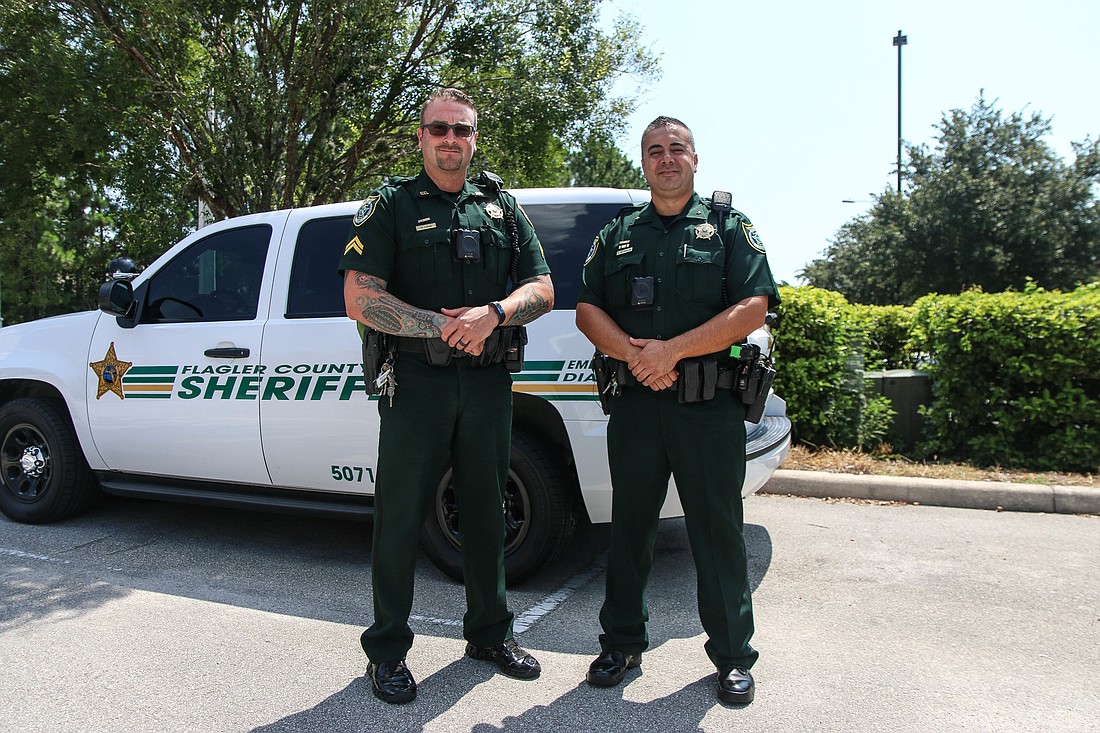- December 13, 2025

Flagler County Sheriff’s Office Cpl. William Lowe has lived in the county since he was 7 years old. He grew up walking the halls as a student at Bunnell Elementary, Buddy Taylor Middle and Flagler Palm Coast High schools.
School resource deputies were his baseball coaches, his mentors. Now, he’s walking those hallways again, but this time, as a school resource deputy himself.
“I wouldn’t say I was an easy youth to deal with by any stretch, and I think that’s why it’s so invaluable to look back on it now, and realize that even though I wasn’t the easiest kid, I can see the impact that [SRDs] had on me,” Lowe said.
With two sons in school, Lowe takes his job as an SRD seriously.
“As a father, I’ve got a personal stake in it. I certainly want to ensure that my kids are as safe as humanly possible,” he said. “Everyone in our unit, for the most part, is a parent. They all have kids in Flagler County Schools. It’s much easier to take this job seriously when it’s your own flesh and blood on the line.”
He is one of the 12 total FCSO SRDs who will be stationed at the nine Flagler County Public Schools and Imagine School at Town Center.
FCSO Cmdr. Philip Reynolds said under Florida Statute Chapter 1006 Section 12, it’s mandated that there be an SRD in every public school.
“So, within the county, we have nine public schools, and we gave the option to charter schools and private schools to have that option as well. One did decide to hire an SRD, which was the Imagine School,” Reynolds said. “So, a grand total of 10 (schools). In the high schools, we will have two resource deputies in every one.”
As a supervisor for the unit, Reynolds will have an office at Matanzas High School and another at BTMS to continue working with the Police Athletic League.
“The first thing is going to be the security aspect of it, to make sure kids are safe,” Reynolds said. “Nowadays, school resource deputies are going to be teaching a lot, especially at the elementary school level. That’s going to be through gangs, drugs and bullying topics, and talking about that if they know of something, to share it with us. There’s no reason to run away from the uniform; they need to run to us and provide that information. So, security is key, first thing, and then the second thing is to do some kind of teaching within the schools.”
Reynolds said that the new additions to the SRD unit have been interviewed, handpicked and trained throughout the summer. The officers, he said, come from the community policing division and must have a few years of experience.
“As far as the tactical standpoint goes, there is a lot of training,” Reynolds said. “Cpl. Lowe is on the SWAT team, so it’s a benefit to have him in the unit because he actually instructs a lot of the fundamentals of the tactical situation, like at Rymfire School, for instance, I think it was a month or two ago that we had training, and we went over the floorplan and how to clear a room.”
Lowe said that Reynolds was one of the SRDs who influenced him as a kid. Now, he gets to bond with kids every day.
“Looking back on it, and saying, ‘How can I impact the community? How can I make this job worth something?’ I think the schools is absolutely where I can make an impact,” Lowe said. “Kids, they need that positive light, and they need to see law enforcement in a much different light than how we’re portrayed in other areas. You know, have that interaction, have that — I don’t want to sound arrogant and call myself a role model for them — but, essentially, we are. We try to be professional; we try to set that standard with the youth and also have fun with them. So, being in this position, it’s a great way to interact with them; it’s a great way to keep them safe.”
Lowe has been with the FCSO for 12 years and is going into his third school year as an SRD. He was stationed at BTMS and Wadsworth Elementary last year, but he’s looking forward to building relationships with a new group of students at Belle Terre Elementary School beginning this fall.
“Interacting with the kids is a great way to read kids, and it’s a great way to read their behavior and maybe what this kid needs versus what this one needs, how you can talk to this one versus how you can talk to that one,” Lowe said. “The only way you can do that is through interaction.”
Reynolds emphasized that repairing an adult is much harder than teaching a child. The department focuses on making sure kids don’t fear officers and that they stay away from drugs and gang activity.
“These kids are our community,” Lowe said. “This is who we are going to be dealing with in 10, 15 years on the street, so can we create better citizens by impacting them at a younger age? I think we can.”